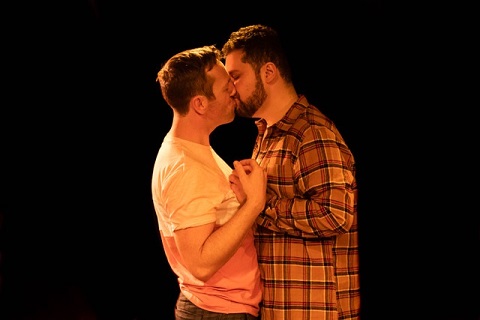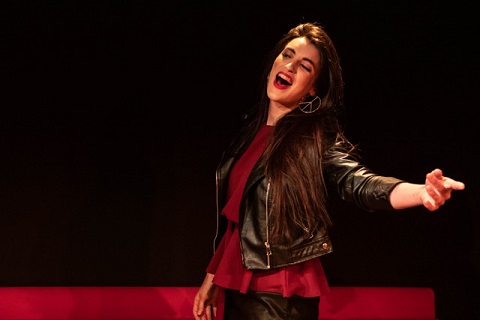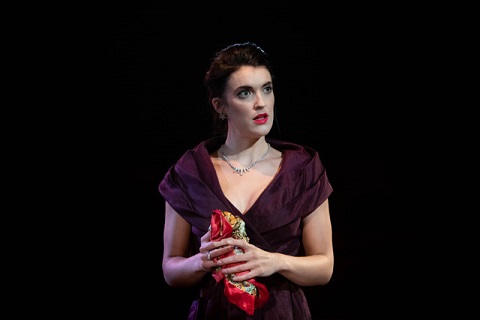
12 Feb 2020
Opera Undone: Tosca and La bohème
If opera can sometimes seem unyieldingly conservative, even reactionary, it made quite the change to spend an evening hearing and seeing something which was so radically done.
English Touring Opera are delighted to announce a season of lyric monodramas to tour nationally from October to December. The season features music for solo singer and piano by Argento, Britten, Tippett and Shostakovich with a bold and inventive approach to making opera during social distancing.
This tenth of ten Live from London concerts was in fact a recorded live performance from California. It was no less enjoyable for that, and it was also uplifting to learn that this wasn’t in fact the ‘last’ LfL event that we will be able to enjoy, courtesy of VOCES8 and their fellow vocal ensembles (more below …).
Ever since Wigmore Hall announced their superb series of autumn concerts, all streamed live and available free of charge, I’d been looking forward to this song recital by Ian Bostridge and Imogen Cooper.
The Sixteen continues its exploration of Henry Purcell’s Welcome Songs for Charles II. As with Robert King’s pioneering Purcell series begun over thirty years ago for Hyperion, Harry Christophers is recording two Welcome Songs per disc.
Although Stile Antico’s programme article for their Live from London recital introduced their selection from the many treasures of the English Renaissance in the context of the theological debates and upheavals of the Tudor and Elizabethan years, their performance was more evocative of private chamber music than of public liturgy.
In February this year, Albanian soprano Ermonela Jaho made a highly lauded debut recital at Wigmore Hall - a concert which both celebrated Opera Rara’s 50th anniversary and honoured the career of the Italian soprano Rosina Storchio (1872-1945), the star of verismo who created the title roles in Leoncavallo’s La bohème and Zazà, Mascagni’s Lodoletta and Puccini’s Madama Butterfly.
Evidently, face masks don’t stifle appreciative “Bravo!”s. And, reducing audience numbers doesn’t lower the volume of such acclamations. For, the audience at Wigmore Hall gave soprano Elizabeth Llewellyn and pianist Simon Lepper a greatly deserved warm reception and hearty response following this lunchtime recital of late-Romantic song.
Collapsology. Or, perhaps we should use the French word ‘Collapsologie’ because this is a transdisciplinary idea pretty much advocated by a series of French theorists - and apparently, mostly French theorists. It in essence focuses on the imminent collapse of modern society and all its layers - a series of escalating crises on a global scale: environmental, economic, geopolitical, governmental; the list is extensive.
For this week’s Live from London vocal recital we moved from the home of VOCES8, St Anne and St Agnes in the City of London, to Kings Place, where The Sixteen - who have been associate artists at the venue for some time - presented a programme of music and words bound together by the theme of ‘reflection’.
'Such is your divine Disposation that both you excellently understand, and royally entertaine the Exercise of Musicke.’
Amongst an avalanche of new Mahler recordings appearing at the moment (Das Lied von der Erde seems to be the most favoured, with three) this 1991 Mahler Second from the 2nd Kassel MahlerFest is one of the more interesting releases.
‘And there was war in heaven: Michael and his angels fought against the dragon; and the dragon fought and his angels, And prevailed not; neither was their place found any more in heaven … that old serpent … Satan, which deceiveth the whole world: he was cast out into the earth, and his angels were cast out with him.’
If there is one myth, it seems believed by some people today, that probably needs shattering it is that post-war recordings or performances of Wagner operas were always of exceptional quality. This 1949 Hamburg Tristan und Isolde is one of those recordings - though quite who is to blame for its many problems takes quite some unearthing.
There was never any doubt that the fifth of the twelve Met Stars Live in Concert broadcasts was going to be a palpably intense and vivid event, as well as a musically stunning and theatrically enervating experience.
‘Love’ was the theme for this Live from London performance by Apollo5. Given the complexity and diversity of that human emotion, and Apollo5’s reputation for versatility and diverse repertoire, ranging from Renaissance choral music to jazz, from contemporary classical works to popular song, it was no surprise that their programme spanned 500 years and several musical styles.
The Academy of St Martin in the Fields have titled their autumn series of eight concerts - which are taking place at 5pm and 7.30pm on two Saturdays each month at their home venue in Trafalgar Square, and being filmed for streaming the following Thursday - ‘re:connect’.
The London Symphony Orchestra opened their Autumn 2020 season with a homage to Oliver Knussen, who died at the age of 66 in July 2018. The programme traced a national musical lineage through the twentieth century, from Britten to Knussen, on to Mark-Anthony Turnage, and entwining the LSO and Rattle too.
With the Live from London digital vocal festival entering the second half of the series, the festival’s host, VOCES8, returned to their home at St Annes and St Agnes in the City of London to present a sequence of ‘Choral Dances’ - vocal music inspired by dance, embracing diverse genres from the Renaissance madrigal to swing jazz.
Just a few unison string wriggles from the opening of Mozart’s overture to Le nozze di Figaro are enough to make any opera-lover perch on the edge of their seat, in excited anticipation of the drama in music to come, so there could be no other curtain-raiser for this Gala Concert at the Royal Opera House, the latest instalment from ‘their House’ to ‘our houses’.
"Before the ending of the day, creator of all things, we pray that, with your accustomed mercy, you may watch over us."

If opera can sometimes seem unyieldingly conservative, even reactionary, it made quite the change to spend an evening hearing and seeing something which was so radically done.
I don’t think what Opera Undone chose to do with Puccini’s Tosca and La bohème would appeal in the slightest to purists, but on its own terms it was highly imaginative - and not particularly beyond the parameters of some staged productions we might see today at ENO, Salzburg or even Bayreuth.
Where Opera Undone differs is in the concentration of the libretto to an hour in length for each opera, a translation into vernacular English which bears almost no resemblance to the Italian original and in themes which evoke periods in time which are centuries beyond Puccini’s settings. The staging of each opera is so minimalist we could really be anywhere rather than somewhere in particular - it’s almost the Theatre of the Absurd; Ionescu and Beckett, or even Genet, colliding with Puccini. Tosca is probably the less controversial of the two productions here; La bohème is absolutely controversial - and, it should be said, one of the funniest, yet undoubtedly tragic, performances of an opera I have seen.
La bohème , according to Opera Undone, is about polyamory, homosexuality, cruising for picks-ups on gay chatlines, sexual identity, HIV, drug addiction and co-dependency. In one sense I was interested in seeing this production because it was set in Peckham, a part of south London a few miles from the very leafy part of the city in which I live. It would have been easy to stereotype, and, in a sense, this is rather what happened. Marcello (here called Marcus) is every inch the typical Peckham, white, working-class guy - right down to the leather jacket, and silver chains around his neck and wrists. Musetta (Melissa) was even worse. Only Rodolfo (Rod) and Mimi (Lucas) stand outside the stereotypes (though I do know a lot of gay men who wear plaid shirts and jeans). But the subjects touched on are universal, they could have, and do, infect every part of a city. Tosca was simply set in New York; Puccini’s original simply Paris.
 La bohème. Photo credit: Ali Wright.
La bohème. Photo credit: Ali Wright.
Condensing either opera down to an hour certainly isn’t easy. Tosca was better done, and we got a fairly good slice of the Scarpia - Tosca scene from Act II here. The focus on both operas was to maintain the big arias - so we got ‘Recondita armonia’, ‘Vissi d’arte’ and ‘E lucevan le stelle’ (or versions thereof), and the same was the case in La bohème. Mimi’s lingering death - whether it be from tuberculosis or from a drug overdose - or whether it is wrought with the power of emotion or with a foaming mouth is long in whichever version one sees it. It is no longer a challenge for an audience to see two men kiss on stage, nor for a libretto to be liberally peppered with “fucks” here and there.
The humour in both productions could perhaps have seemed misplaced, but it worked very well. Cavaradossi (abbreviated to Cav) is still an artist, though should one feel pity for the woman in the audience who spent much of Act I with a picture frame hanging from her shoulders? La bohème was even more striking for involving the audience. Musetta spent an awfully large part of Act I sitting between people or draping herself over them. But strip the humour out and there were moments of drama. Cavaradossi received quite a beating before being hooded and shot; Mimi’s drug induced death was raw, and certainly done with a sense of reflective realism.
The singing was largely very impressive, though the rather intimate size of Studio 2 at Trafalgar Studios can magnify, and sometimes strain, the tone of the voices to a considerable degree. I think all of the soloists deserve credit for bringing in performances that were very well sung - balancing pathos and humour with equitability, and acting, that never bordered on the wooden. Fiona Finsbury’s Tosca was a standout performance, extremely nuanced, and really quite powerful throughout Act II. The notes are there, her upper range entirely confident. She had no difficulty suggesting Tosca’s growing revulsion or despair. The other dominant performance was the Rodolfo of Roberto Barbaro. I think he started slightly short on confidence, but the warmth and colour of his voice is beautiful to listen to. One is entirely persuaded that this is a tenor who emotes what he sings; I could swear that in his duet with Mimi, where Mimi confesses to his drug use after their relationship has ended, there were genuine tears in his eyes.
 Tosca. Photo credit: Ali Wright.
Tosca. Photo credit: Ali Wright.
Honey Rouhani’s Musetta was high on humour and high on vocal strength. Roger Paterson’s Cavaradossi provided a couple of moments during his ‘E lucevan le stelle’ where his top notes had both more security at the top and stability in the length of them than I have heard more star name tenors sing. Hugo Herman Wilson’s Scarpia was never short on power, and neither did he shirk from imbuing this particular 1940’s mafia version of him with all his Scarface terror. Michael Georgiou’s Marcelo - he who had voted Tory just once - bounced between Rodolfo and Musetta with witty confidence. Philip Lee’s Mimi ended up becoming a heartrending performance that leant inwards to its inevitable tragedy - the voice clearly capable of going to extremes. His ‘Si, mi chiamano Mimi’ had brought out a very funny side to him as he described selling perfume and taking the late shift at Liberty; and yet, he was entirely moving as he brought an almost positive happiness to his terminal sleepiness after taking one last hit of drugs.
Entirely outstanding throughout the entire evening was David Eaton’s playing of the formidably taxing piano parts of Puccini’s scores.
I’m not sure what my expectations were for this particular evening. Whatever they might have been, purism wasn’t one them. This was in many ways operatic revisionism, opera as theatre, opera as popular art, opera as openly accessible. It could be serious and humorous in equal measure and was an entirely enjoyable way to spend two hours.
Marc Bridle
Opera Undone: David Eaton (Music Director), Adam Spreadbury-Maher (Director)
Tosca : Tosca - Fiona Finsbury, Scarpia - Hugo Herman Wilson, Cavaradossi - Roger Paterson
La bohème : Rodolfo - Roberto Barbaro, Mimì - Philip Lee, Musetta (Melissa) - Honey Rouhani, Marcelo (Marcus) - Michael Georgiou
Trafalgar Studios, London; Tuesday 11th February 2020.